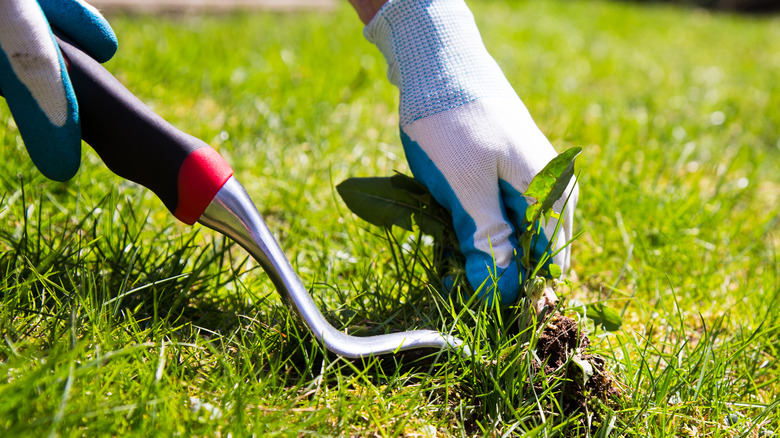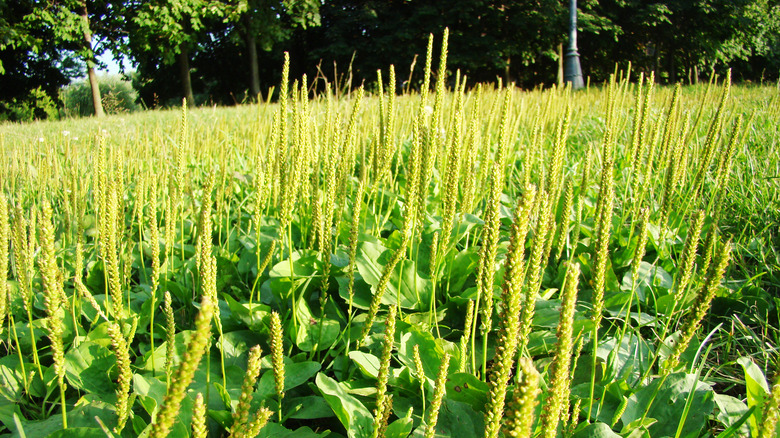The pleasant serenity of a homogeneously green lawn can be quickly marred by the arrival of a common weed: the broadleaf plantain. But then again, if you have a strong, healthy, green lawn, you aren’t likely to see Plantago major very much. The weed tends to prefer lawns that don’t have great grass. Instead, they thrive where the soil is dense and compacted, a little wet, and even trampled a lot. It isn’t very particular and can spring up in driveway cracks or against a sidewalk as easily as in the middle of a lawn.
Broadleaf plantain is just about everyone’s unwelcome guest. It has been known for ages for its medicinal and edible qualities, but in the present day, it is much despised for making pretty lawns look bad. Extremely common throughout all of North America, broadleaf plantain isn’t picky about where it chooses to live and, in fact, is the most common weed after the dandelion. Much like the dandelion, it is detested by lawn lovers even though it has a multitude of redeeming qualities. You can easily recognize the familiar weed by its oval-shaped, somewhat shiny leaves, which are about as big as an adult’s ear and have veins running from base to tip. The leaves grow in a spiral from a central root and send up a distinctive-looking spike of tiny seeds.
Natural and organic options for eradicating broadleaf plantain

When you come right down to the root of the problem with weeds, it’s their roots. The most natural and organic option for eradicating any weed in your yard or garden is to pull it up by the root by hand, but doing so effectively usually means getting every bit of the root, and broadleaf plantains are no exception to that mandate. If you notice that you don’t have a lot of broadleaf plantains overrunning your yard, take action right away. Grab your weed puller and use a little good old-fashioned elbow grease. You might have a typical weed puller that is a long stick with a prong at the end or a newer style like the stand-up weed puller that people are talking about, but whatever gadget you use, be sure you’re getting the entire root. Broadleaf plantain roots don’t extend very deep into your dirt, but to be effective, you’ll need to get it all.
If pulling up the broadleaf plantains isn’t an option, another organic choice is a mixture of vinegar, Epsom salts, and dish soap, but be careful it doesn’t touch anything but the weed. The caustic solution is potent. Combine 1 cup of salt with ½ a gallon of 5% diluted white vinegar and 2 tablespoons of dishwashing liquid, like Dawn (the grease-cutting properties help the solution stick to the weed). Spray it on the offending plant and watch it wither.
Getting rid of broadleaf plantain in established lawns

Eradicating broadleaf plantain in a more established lawn can be a tougher chore to tackle. If the infestation is more widespread (after all, broadleaf plantain is considered an aggressive plant), pulling it up by hand or using natural, homemade solutions like the one with vinegar and Epsom salts won’t necessarily do the job.
In a situation where a large area is affected by the growth of broadleaf plantain, particularly if it has infiltrated an established lawn that you don’t want to have to destroy in the process, the choices are more limited. Even so, there are some options available that will restore your lawn to a green, homogenous, weed-free condition. The West Virginia University Extension recommends that herbicides be used for lawns that overrun with broadleaf plantains. The type that works, their experts say, is “a herbicide containing 2,4-D or triclopyr (Turflon) as active ingredients or a pre-mixed herbicide, such as Q-4, containing multiple active ingredients.” The best time to apply the weed-killing formula is in the late fall. If you notice individual plants cropping up in the spring, tackle them right away by dousing them with glyphosate (the commercial name is Roundup).